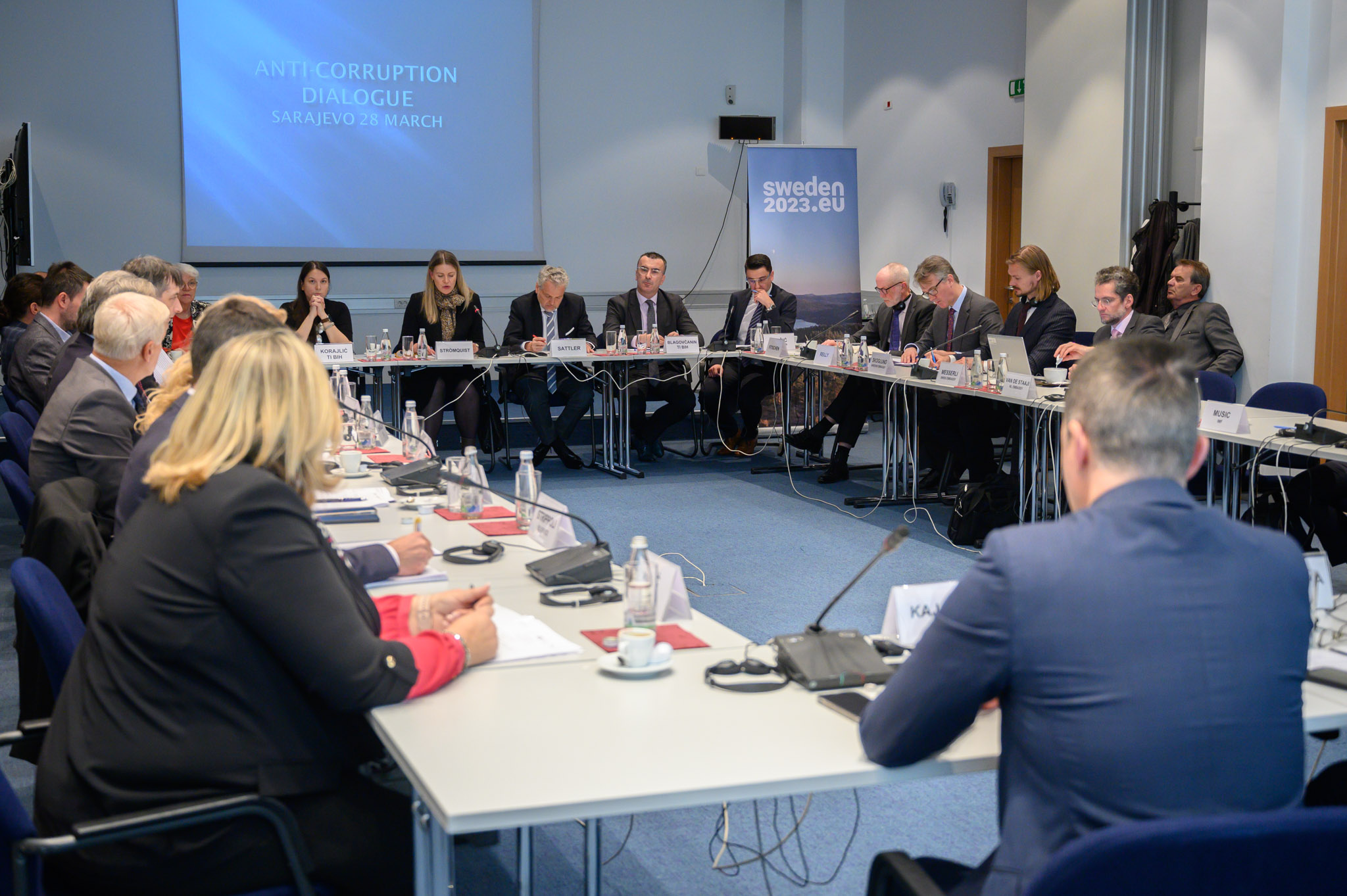The fight against corruption in Bosnia and Herzegovina (BiH) was under the spotlight in a roundtable discussion organised today by the Delegation of the European Union/EU Special Representative in BiH, the Embassy of Sweden to BiH, and Transparency International in BiH. The roundtable brought together representatives of the legislative, executive, judicial, and supervisory authorities, as well as representatives of the international community, civil society, and the media for and interactive and dynamic dialogue on how to approach the long-standing challenges of systemic corruption in the country.
“As part of my job, I talk to people from all walks of life in Bosnia and Herzegovina. Corruption is always at the top of the list of concerns of all. Corruption steals from future generations and acts as a brake on economic and social progress. By awarding candidate status, the EU’s leaders have confirmed that the place of Bosnia and Herzegovina is in the European Union. However, candidate status is also expected to generate momentum that will lead to key reforms being passed. The people of BiH expect progress. This country cannot afford more years of missed opportunities,” said the Head of the EU Delegation and EU Special Representative to BiH, Ambassador Johann Sattler.
During the conference it was particularly emphasised that in order to make tangible progress in the fight against corruption, Bosnia and Herzegovina needs to adopt several reforms, including integrity amendments to the HJPC Law, a Law on Conflicts of Interest, a Law on Courts, strengthen protection of whistleblowers, depoliticise public companies, and fundamentally reform the judiciary. It was also underlined that BiH finally has to achieve tangible results in terms of investigations, criminal prosecutions, and final convictions in cases of organised crime and corruption, including those at a high level.
“The member states of the EU has granted Bosnia and Herzegovina candidacy status. It is an opportunity for political leaders to make real progress on much needed reforms. Not least in the field of rule of law and greater transparency, including within the judicial system. Gathering representatives of the state government, parliament, and relevant institutions at today’s anti-corruption dialogue, we hope to give decision-makers a chance to renew their commitment to work against corruption, and by that improve both the lives of citizens and conditions for investments, while taking real steps on the EU path,” said Johanna Strömquist, Ambassador of Sweden to Bosnia and Herzegovina.
Negative developments that affect freedom of expression, freedom of the media, and pressure on those who uncover and report on corruption were also discussed. Participants expressed concerns about the impact of the criminalisation of defamation in the Republic of Srpska, as well as the adoption of a proposed law that would place limits on the work of numerous non-governmental organisations.
“Fighting corruption requires not only repressive but also preventive activities, that will raise awareness among citizens that they should not accept corruption as a ‘normal way of life’, and should instead fight it, realizing how negatively it impacts themselves and the security, in narrow and broader sense. Bosnia and Herzegovina, and us, its citizens, want and have opted for its European path, which has no alternative. That is why the Ministry of Justice and the entire Council of Ministers of BiH have the task of creating a legal framework and legislative space for the prevention and successful fight against corruption”, said Minister of Justice Davor Bunoza.
The devastating consequences of widespread and deep-rooted corruption are causing increasing damage to Bosnia and Herzegovina, which, according to the latest results of the Corruption Perceptions Index (CPI) for 2022, has become the third worst country in Europe. This is the worst result since 2012, and BiH records the worst trend among all countries in the region, which indicates a constant deterioration in the trust of BiH citizens in judicial institutions, law enforcement agencies, and public administration as a whole.
“Due to the devastating consequences of widespread corruption in almost all aspects of social, political and economic life, corruption represents priority number one. Especially bearing in mind the fact that without progress in the fight against corruption, it is not possible to expect reforms in any other sector in BiH,” said Srđan Blagovčanin, Chair of the Board of Directors of Transparency International BiH.

